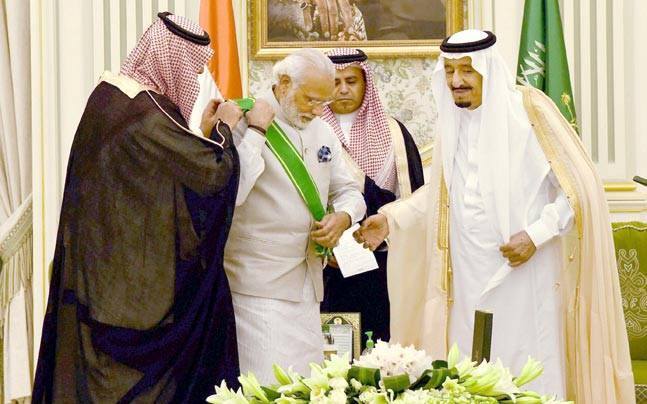10 Days After PM Modi's Visit: Saudi Arabia Supports Kashmir 'Self Determination'

NEW DELHI: Prime Minister Narendra Modi’s visit to Saudi Arabia has failed to mitigate its position on Kashmir at the Organisation of Islamic Cooperation meet.
The OIC contact group of Saudi Arabia, Pakistan, Turkey, Niger and Azerbaijan included Kashmir in its agenda for the 13th summit in Turkey this week, expressing concern about the “human rights violations and abuse of the basic rights of the Kashmiris.” And supporting the Kashmiris right to self determination.
PM Modi’s visit to Riyadh and the joint statement was projected as a major coup by the Indian establishment. More so as the visit had coincided with what observers had perceived as a cooling off between Riyadh and Islamabad because of the latter’s ties with Iran, and its refusal to sink all its eggs in the Saudi strategic basket. The Indian Prime Minister had received a warm welcome, and the visit had been pitched as a major breakthrough by the Ministry of External Affairs and the media.
However, the OIC contact group meeting has indicated that not much has changed on the ground, with Saudi Arabia bringing up the issue of Kashmir even before the ink has dried on its agreement with India. The joint statement issued by PM Modi and Saudi King Salman bin Abdul Aziz al Saud on April 3, a little over ten days ago, stated, “The two leaders expressed strong condemnation of the phenomenon of terrorism in all its forms and manifestations, irrespective of who the perpetrators were and of their motivations."
The statement had been interpreted here to say that while, of course there was no dramatic shift in policy, Saudi Arabia had recognised the Indian position to differentiate between human rights violations and Pakistan sponsored terrorism per se. Saudi Arabia seems to have delivered a straight blow to this. "The contact group had been constantly conveying the OIC's concerns to the international community regarding the flagrant human rights violations and abuse of the basic rights of the Kashmiris," the Pakistan foreign ministry quoted Saudi Arabian secretary general of the OIC contact group, Abdullah Al-Alim, as saying.
"He regretted some attempts to equate the Kashmiri struggle with terrorism, and emphasised that Kashmiris were solely striving to achieve their inalienable right in accordance with relevant UN resolutions." The OIC has followed Pakistan’s lead on Kashmir much to India’s chagrin. Diplomatic efforts to cut into this ‘solidarity’ on Kashmir by India have come a cropper with government responses over the years varying between a high sensitivity to a ‘ignore OIC” mode. However, given the welcome and the content of the joint statement on terrorism there was optimism in New Delhi that the Prime Ministers visit would impact on the Saudi position on Kashmir. As sources said that while a dramatic volte face was not expected, a more diplomatic approach on Kashmir from Saudi Arabia was seen as a possibility. More so after Pakistan went to the OIC last November on the issue of Kashmir yet again.
Saudi Arabia, however, made it clear that it would not be drawn out on Kashmir with the above reference to “some attempts to equate the Kashmiri struggle with terrorism” would be resisted. Self determination for the Kashmiris, thus, remained on top of the agenda with the Ministry of External Affairs and the Prime Ministers Office here now required to review what they had listed as the ‘gains’ of the PMs visit to Riyadh.



